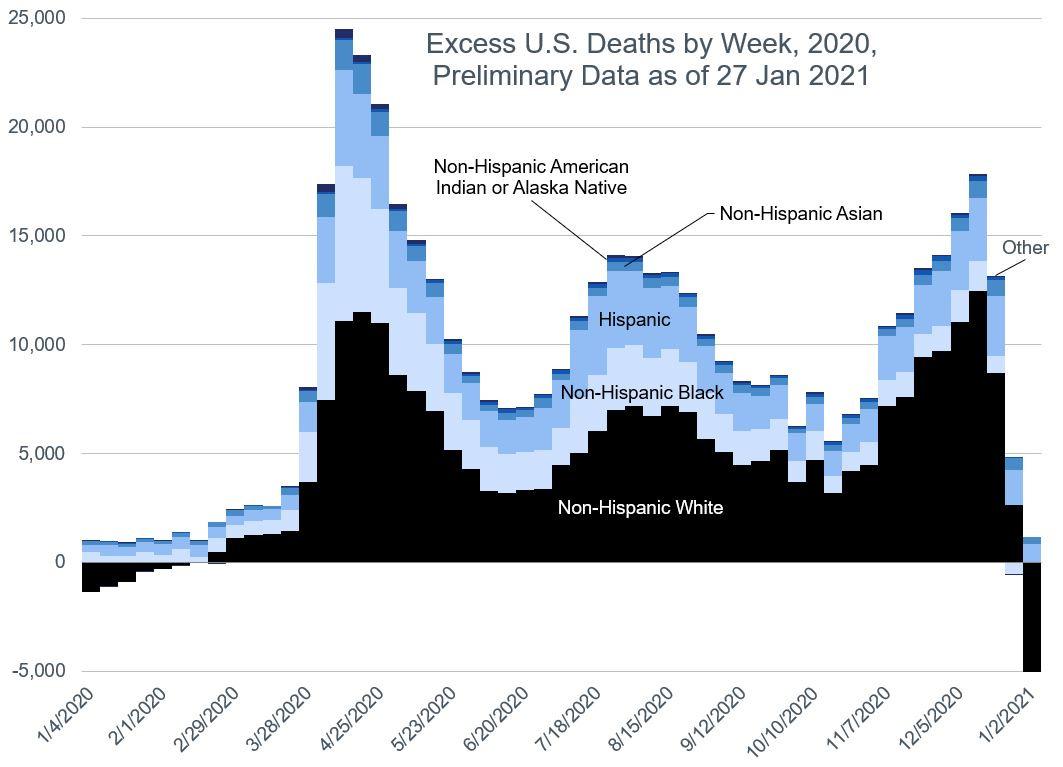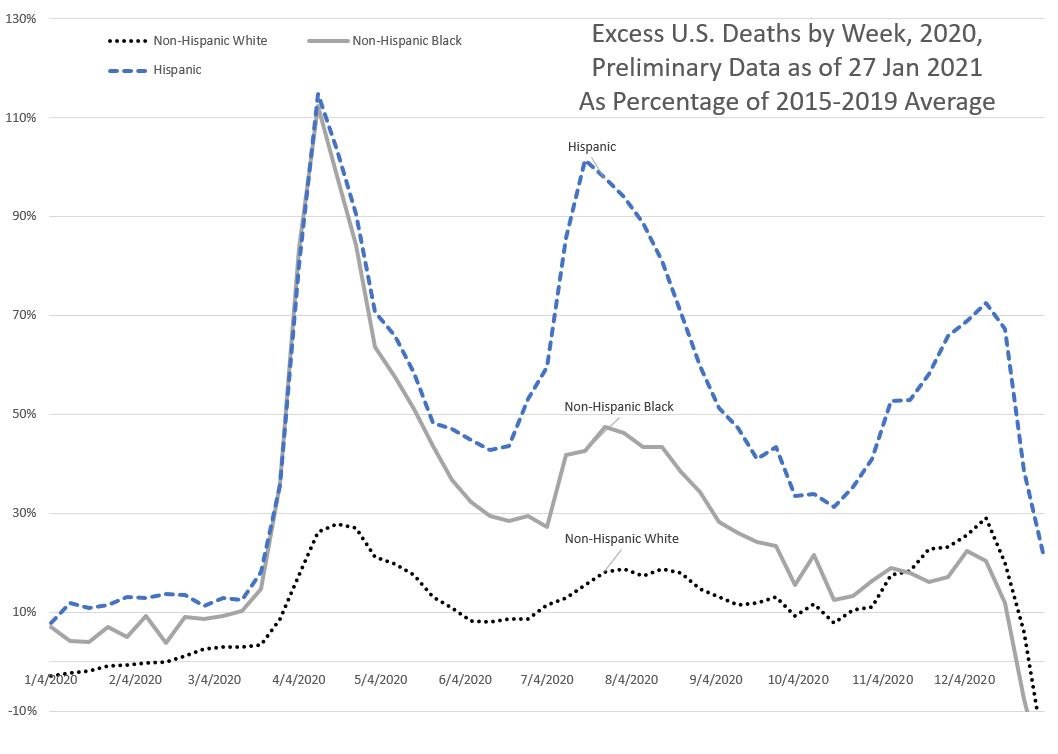Link: https://marypatcampbell.substack.com/p/mortality-with-meep-total-us-excess-58f
Graphs:


Author: Mary Pat Campbell
Publication Date: 28 January 2021
Publication Site: STUMP
All about risk
Link: https://marypatcampbell.substack.com/p/mortality-with-meep-total-us-excess-58f
Graphs:


Author: Mary Pat Campbell
Publication Date: 28 January 2021
Publication Site: STUMP
Excerpt:
Investors who sold GameStop short have lost $23.6 billion so far in 2021 through Wednesday, by the count of financial analytics firm S3 Partners. That includes $14.3 billion yesterday, as the retailer’s stock price shot up 135%.
In response to the controversy, Robinhood and Interactive Brokers Group curbed trading on GameStop, AMC, and several others Thursday morning. GameStop shares began to reverse direction. How long the restrictions would last was unclear. Frustrated amateur traders, of course, might just take their business to platforms that don’t limit them.
The pain is intense for these hedge funds. Citron Capital’s Andrew Left, often disparaged on Reddit, just said his firm folded a GameStop short bet, after losing 100% of its money spent on the transaction. Melvin Capital Management has slumped about 30% as the result of GameStop short sales, according to published reports. New York Mets owner Steve Cohen’s Point72 fund and Ken Griffin’s Citadel have stakes in Melvin.
Author: Larry Light
Publication Date: 28 January 2021
Publication Site: ai-CIO
Excerpt:
When Steven Herbert started at the Kentucky Retirement Systems (KRS) last week, after a monthslong talent search, he became the sixth investment chief in 13 years to take the helm at the struggling pension program.
Kentucky Retirement Systems CIO Steven Herbert
The $18.3 billion state system has had a tough time holding on to its investment staff. Herbert will replace Rich Robben, the former CIO who departed last fall for a consulting position. But other allocators have decamped before him, including David Peden, now a consultant at Mercer subsidiary Pavilion; TJ Carlson, now CIO at Texas Municipal; Adam Tosh, now senior portfolio manager in Alaska’s Bristol Bay Native Corporation; and John Krimmel, now an NEPC consultant.
Author: Sarah Min
Publication Date: 28 January 2021
Publication Site: ai-CIO
Excerpt:
GameStop and AMC Entertainment tumbled in overnight trading, then rebounded sharply in the premarket Thursday following a meteoric rally amid a retail buying frenzy.
Shares of the brick-and-mortar video game retailer dropped 15.97% in extended trading, following a more-than 130% gain during regular hours. In premarket trading early Thursday, its shares bounced 30% higher.
The movie theater chain sank 26.58% in overnight trading, after shares soared 300% in extremely heavy trading. Its shares were little changed in premarket trading.
The pair have been popular targets in the “Wallstreetbets” Reddit chat room where a wave of at-home traders focus on heavily shorted stocks, pushing share higher and squeezing out short-selling hedge funds.
Author: Yun Li
Publication Date: 27 January 2021
Publication Site: CNBC
Excerpt:
Illinois Gov. J.B. Pritzker tapped incumbent Illinois Sports Facilities Authority board member Leslie Darling to replace outgoing chairman Manuel ?Manny? Sanchez, putting her at the helm of the agency hit hard by the COVID-19 pandemic?s deep wounds to hotel taxes, which are used to repay its debts.
The board governs the agency that owns and operates and issued $150 million of bonds in 1989 for Guaranteed Rate Field where Major League Baseball?s White Sox play and served as the issuer for $400 million of 2001 bonds that financed the renovation of the Chicago Park District-owned Soldier Field ? home of the National Football League?s Chicago Bears. About $430 million of debt is outstanding.
Author: Yvette Shields
Publication Date: 25 January 2021
Publication Site: Fidelity Fixed Income
Excerpt:
Negotiations on Puerto Rico?s central government and electric power authority debts have extended for several years, leaving participants with clashing views of the length of time they have taken and the lack of resolution of the island’s debts.
A Feb. 10 deadline looms for the Oversight Board to at least submit a bond deal resolution proposal and several participants expect progress in the coming year.
Since the signing of PROMESA, the Puerto Rico Oversight, Management, and Economic Stability Act, Puerto Rico has been hit or at least shaken by Hurricane Maria, political protests forcing the exit of Ricardo Rossell?, earthquakes, and the COVID-19 pandemic.
Author: Robert Slavin
Publication Date: 25 January 2021
Publication Site: Fidelity Fixed Income
Link: https://ammo.com/articles/us-federal-income-tax-guide-16th-amendment-history
Excerpt:
One of these political events was the War of 1812. This war may have inspired Francis Scott Key to write “The Star-Spangled Banner” as he famously watched the rockets red glare over Fort McHenry, but it was also straining our fiscal resources and the war effort needed to be financed.
Enter the idea of a progressive income tax – based on the British Tax Act of 1798 (which should have been our first warning). Fortunately for the time, the War of 1812 came to a close in 1815, and the discussion of enacting an income tax was tabled for the next few decades.
Ever so stubborn, progressive individuals were hell-bent on enacting income taxes, and they eventually found a way to do this at a local and state level. In time, they would reignite a new movement for the adoption of the federal income tax.
Author: Jose Nino
Accessed: 28 January 2021
Publication Site: ammo.com
Link: https://fixedincome.fidelity.com/ftgw/fi/FINewsArticle?id=202101220939SM______BNDBUYER_00000177-208e-d29a-ab7f-b8fea05d0001_110.1
Excerpt:
In sidestepping for now a planned subway and bus fare increase ? a public-relations third rail ? New York?s Metropolitan Transportation Authority called a familiar crisis-management play. It bought time.
Its board on Thursday agreed at Chairman Patrick Foye?s urging not to vote on a 4% biennial fare and toll hikes.
The state-run MTA, which operates mass transit in the New York City region, is in line for $4 billion from the federal rescue bill passed last month and the prospects of an even bigger aid package under President Biden and new Senate majority leader, New York Democrat Charles Schumer.
….
Still, the authority, one of the largest municipal issuers with $47.5 billion of core-credit debt, faces a budget crunch and a variety of pandemic-related uncertainties.
Author: Paul Burton
Publication Date:
Publication Site: Fidelity Fixed Income
Link: https://www.wsj.com/articles/cuomos-tax-ultimatum-11611359134?mod=opinion_lead_pos4
Excerpt:
Viewers of Andrew Cuomo’s Emmy-award winning Covid-19 briefings may have noticed how the New York Governor has become increasingly excitable. In this week’s budget show, he pointed an economic gun at New York and threatened to shoot if Washington doesn’t fork over $15 billion.
“If the federal government doesn’t fund state and local governments, it’s going to hurt all New Yorkers,” Mr. Cuomo warned Tuesday while proposing to raise the state’s top income tax rate in New York City to 14.7%. This would be the highest rate in the country, at least until New Jersey Gov. Phil Murphy makes a competing bid.
Publication Date: 22 January 2021
Publication Site: WSJ
Link: https://www.pionline.com/pension-funds/calpers-expecting-announce-new-cio-quarter
Excerpt:
Even as CalPERS officials were facing the dual challenges of managing investments and remote work during a pandemic, it was moving ahead with hiring a new CIO and expects to name one in the first quarter, a top official said.
Author: Arleen Jacobius
Publication Date: 25 January 2021
Publication Site: Pensions & Investments
Link: https://crr.bc.edu/wp-content/uploads/2021/01/wp_2021-3_.pdf
Abstract
Workers have the option of claiming Social Security retirement benefits at any age between 62 and 70, with later claiming resulting in higher monthly benefits. These higher monthly benefits reflect an actuarial adjustment designed to keep lifetime benefits equal, for an individual with average life expectancy, regardless of when benefits are claimed. The actuarial
adjustments, however, are decades old. Since then, interest rates have declined; life expectancy has increased; and longevity improvements have been much greater for high earners than low earners. This paper explores how changes in longevity and interest rates have affected the
fairness of the actuarial adjustment over time and how the disparity in life expectancy affects the equity across the income distribution. It also looks at the impact of these developments on the costs of the program and the progressivity of benefits.
The paper found that:
• The increases in life expectancy and the decline in interest rates argue for smaller reductions for early claiming and a smaller delayed retirement credit for later claiming.
• Specifically, the benefit at 62 should equal 77.5 percent, as opposed to 70.0 percent, of the full age-67 benefit, and the benefit at 70 should equal 119.9 percent, instead of 124.0 percent, of the full benefit.
• The outdated actuarial adjustments are a modest moneymaker for the program – about $1.9 billion in 2018, with most of the gains coming from those claiming at 62, who are typically lower earners. Surprisingly, the correlations between earnings and life expectancy and between earnings and claiming behavior have only modest implications for both the cost and progressivity of Social Security benefits.
• Finally, the cost and distributional effects of earnings-related life expectancy and claiming cannot be addressed through the actuarial adjustments for early and late claiming. They reflect the fact that high earners get their large benefits for a long time and low earners get their more modest benefits for a shorter time.
Authors: Andrew G. Biggs, Anqi Chen, and Alicia H. Munnell
Publication Date: January 2021
Publication Site: Center for Retirement Research at Boston College